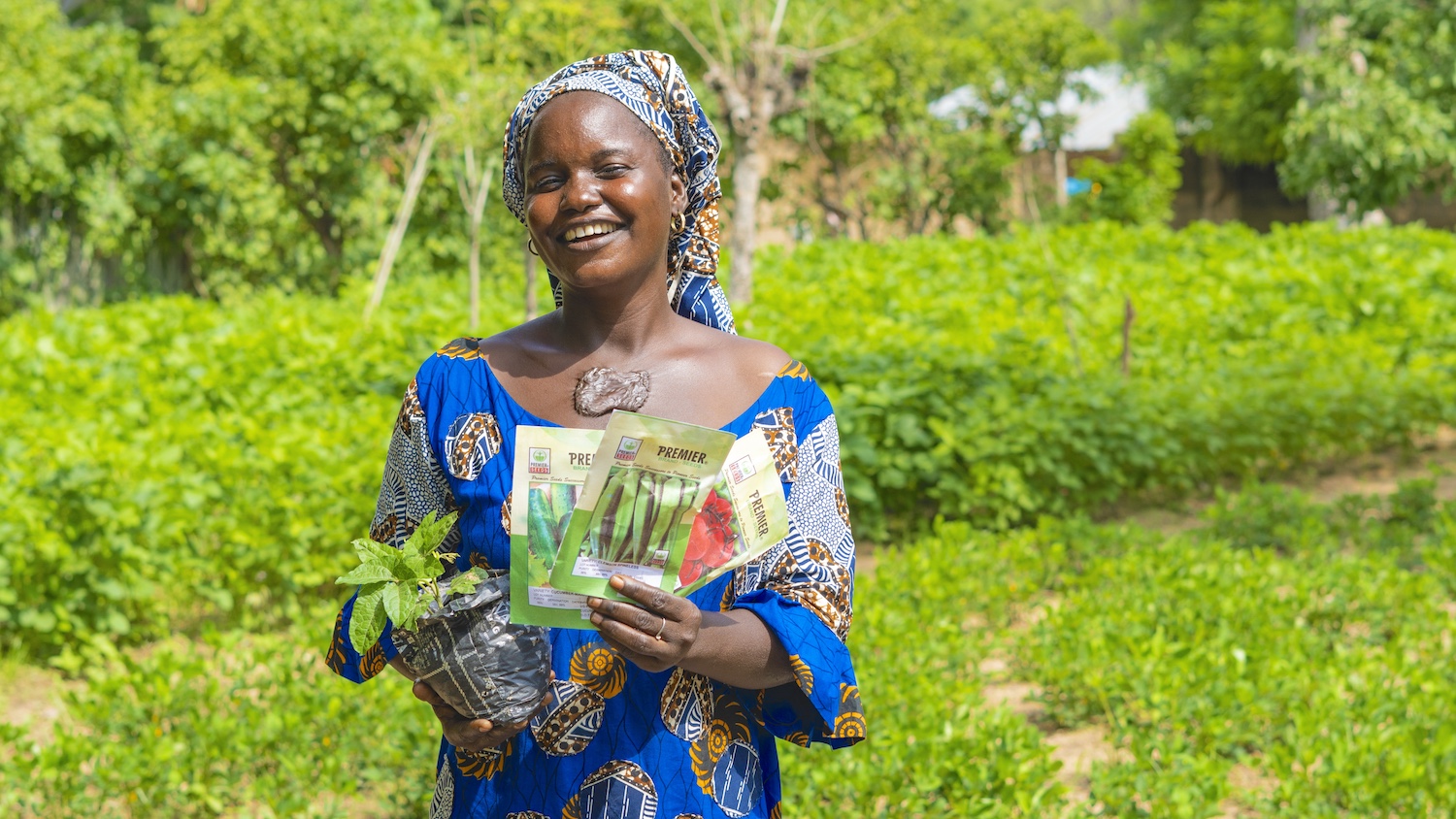What is World Food Day?
Nuru is proud to stand with other organizations, governments, and businesses around the globe today, as we recognize World Food Day. World Food Day is celebrated annually on October 16 to commemorate the founding of the Food and Agriculture Organization (FAO) of the United Nations in 1945. World Food Day aims to raise awareness about sustainable agriculture, food security, global hunger, and malnutrition. The day also serves as a platform to encourage collective action to address these critical issues and promote efforts towards ensuring that everyone has access to food.
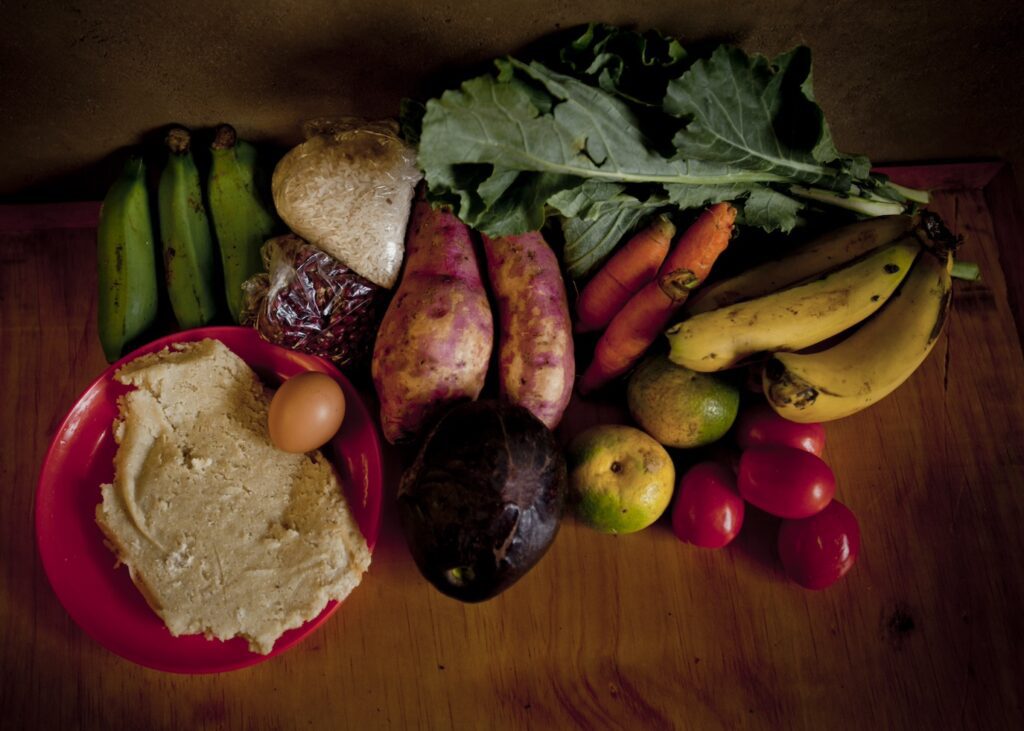
World Food Day 2024 Theme: Right to Foods for a Better Life and a Better Future
This year’s World Food Day theme is the right to foods for a better life and a better future. The 2024 State of Food Security and Nutrition in the World Report (SOFI) shows that in 2023, 2.3 billion people–or 28.9% of the global population–experienced moderate to severe food insecurity. This means that more than one in four people lacked access to sufficient food. The right to foods is a fundamental human right recognized in the Universal Declaration of Human Rights. However, it is agricultural households–those that produce our food–that are often the most affected by persistent hunger.
Why is World Food Day important to Nuru?
The Nuru Collective focuses on supporting smallholder farmers and rural entrepreneurs in regions highly vulnerable to food insecurity, instability, and the compounding impacts of climate change and poverty. Nuru addresses these injustices through member-owned agribusinesses that increase economic potential and food production. Through agribusinesses, Nuru aims to increase incomes and crop yields of agribusiness members, strengthening rural resilience and food security.
These agribusinesses utilize strategies that prioritize climate-smart agricultural (CSA) practices to increase yields and incomes in higher-value legume crops like groundnut and soybean. Crops like these enrich the soil with nitrogen, improving soil health over time. They also serve to increase the household supply of protein and improve nutrition. By prioritizing agricultural practices that replenish soil alongside other climate change adaptation and mitigation activities, Nuru aims to ensure that farmers can continue farming on productive land for generations to come.
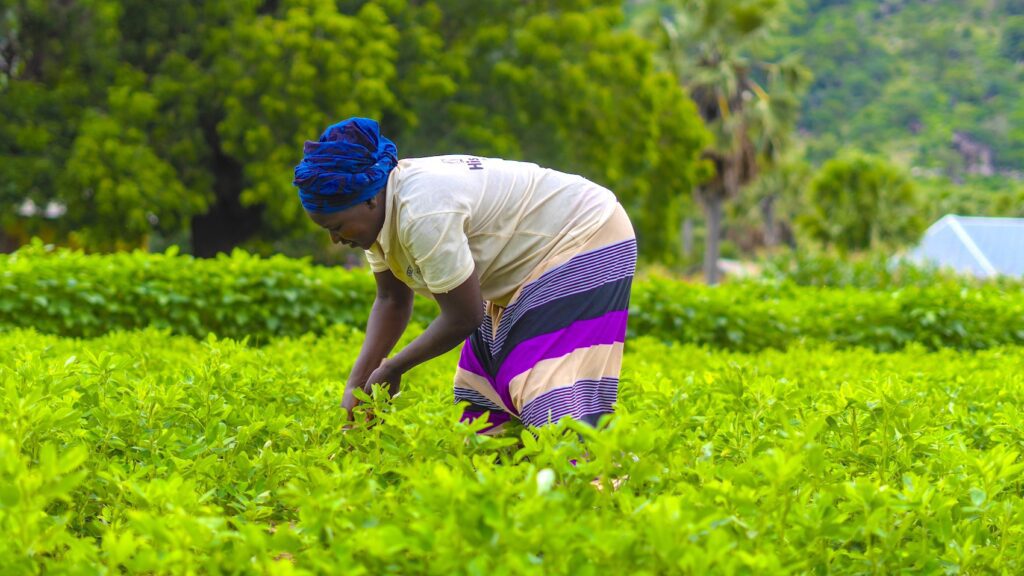
Nuru Nigeria, woman farmer, 2023
Permagardens Support World Food Day “Right to Foods” Theme
Since 2019, Nuru Nigeria has been dedicated to increasing food security and improving nutritional outcomes through permagarden training. What is a permagarden? Permagardens use ditches designed at the highest point of the land to capture water as it flows into the permagarden. This evenly distributes water and nutrients in the garden beds. Permagardens improve soil fertility and manage water–that may be in either short or abundant supply in climate-impacted areas–to maximize production on small plots of land.
By combining aspects of permaculture and bio-intensive agriculture, permagardens maximize production on small plots of land by using the natural ecosystem to create a year-round vegetable garden. This is done year-around, during both dry and rainy seasons, to produce nutritious vegetables and support food security. Nuru Nigeria trains agribusiness members on permagardens to increase vegetable production, while also diversifying livelihoods by providing an additional source of income through the sale of surplus vegetables.
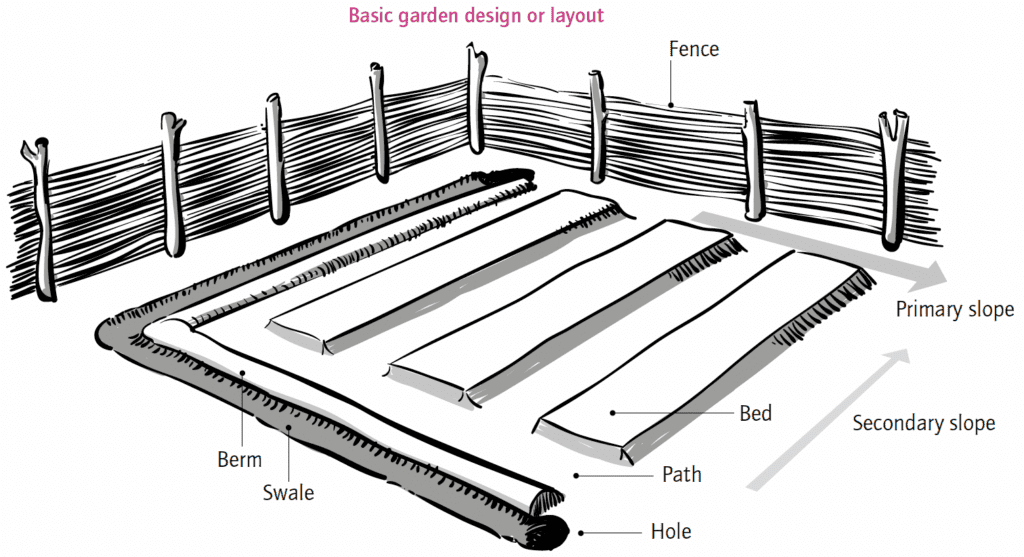
Credit: TOPS Permagarden Toolkit
Permagardens: Engaging Women First
Women often face limited rights, representation, and resources in agricultural spaces. In Nigeria, three main factors contribute to the gender gap in agricultural productivity:
1) women tend to use fewer inputs and have less access to extension services
2) women often cultivate lower-value crops
3) women typically hire less productive labor
Nuru Nigeria aims to promote women-led activites, like permagardens, to take a gender transformative approach in supporting womens’ leadership in their communities and households. Nuru Nigeria trains women to:
1) establish permagardens
2) monitor growth cycles of vegetable varieties to plant new seeds at the end of the growth cycle
3) save newly-produced seeds for next season’s planting supply
Traditionally, women are closely connected to food as agricultural producers and are also responsible for market purchases and household cooking, making them central to food preparation and dietary decisions for their families. Despite this central role, women often eat less and after other family members. Nuru Nigeria’s permagarden training strengthens women’s capacity to grow nutritious vegetables year-round, boosting household food security and nutrition while helping close the gender gap by improving women’s access to extension services and higher-value crops. Permagardens support women agribusiness members and their households to access higher-value, diverse, and nutritious vegetables, contributing to more reliable food security.
The State of Food Security in Northeast Nigeria on this World Food Day
Nuru Nigeria operates in Adamawa State, where food insecurity remains high. In August-September 2024, the region was classified at crisis levels (Integrated Food Security Phase 3) by the Famine Early Warning Sytems Network (FEWS). The situation is worsened by vulnerablility to weather events, as heavy rains and flooding in August displaced hundreds of community members and destroyed their crops. Additionally, rising food prices, driven by inflation and the removal of fuel subsidies, have further strained the region’s food security, underscoring the need for local solutions.
Local and tailored approaches, like permagardens, work to strengthen the capacity of women leaders and address the issue of access to and seasonality of vegetables in rural areas. By increasing the supply of vegetables through permagardens, agribusiness member households can increase their food security and sell additional vegetables to community members, thereby improving access to vegetables and addressing issues of access and seasonality more broadly in their community. As more women adopt permagardens and consistently harvest their vegetables, the right to food becomes more assured, fostering a sustainable, women-led approach to food security.
The Right to Foods and Health
The right to foods is not only about having enough calories. It is the right to all nutritional elements needed for a healthy and active life. A lack of micronutrients or vegetables leads to higher incidences of chronic malnutrition, which leads to cognitive and motor development issues for children (issues that carry on into adulthood). In June, Adamawa State recorded its highest rates of severe acute malnutrition of the year, increasing by 24% compared to the previous month. Improved nutrition leads to better health outcomes.
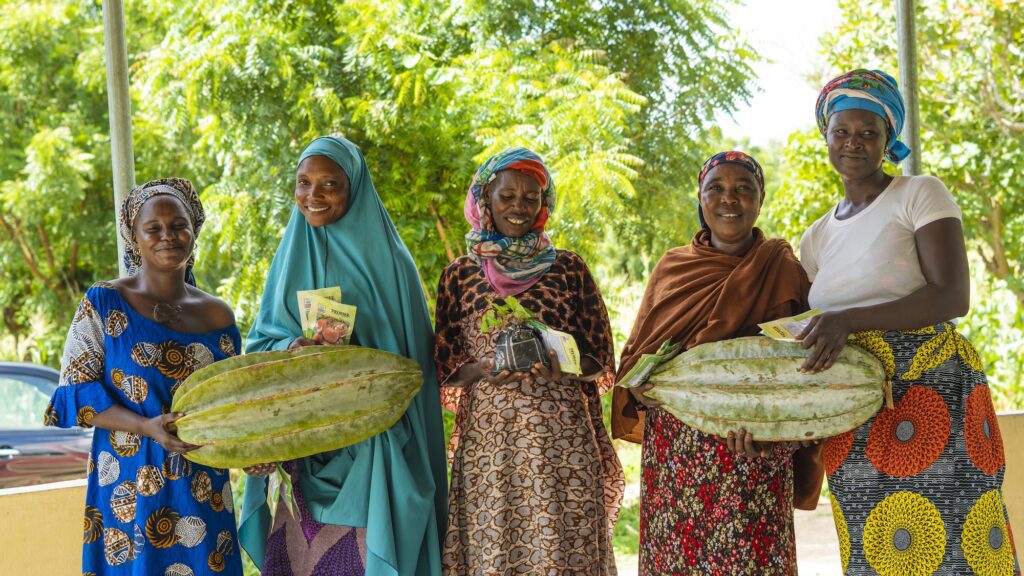
Women farmers with their fluted pumpkin harvests, Nuru Nigeria, 2023
Permagardens promote dietary diversity from a variety of vegetables, ensuring balanced diets and improved overall health. Nuru Nigeria-supported farmers grow tomatoes, bell peppers, fluted pumpkin, okra, eggplant, and cucumbers. As an example of the benefits, tomatoes are rich in vitamin A,C,K, and potassium which help support the immune system and support heart health. Fluted pumpkin is high in calcium, magnesium, and iron which can help to alleviate anemia in women and children, a common condition in places like northeast Nigeria. The diversity of these vegetables can supports access to an array of nutritional benefits, as rural areas experience an ongoing lack of consistent supply of vegetables, leading to high rates of food insecurity and chronic malnutrition.
World Food Day #FoodHeroes: Meet Bless
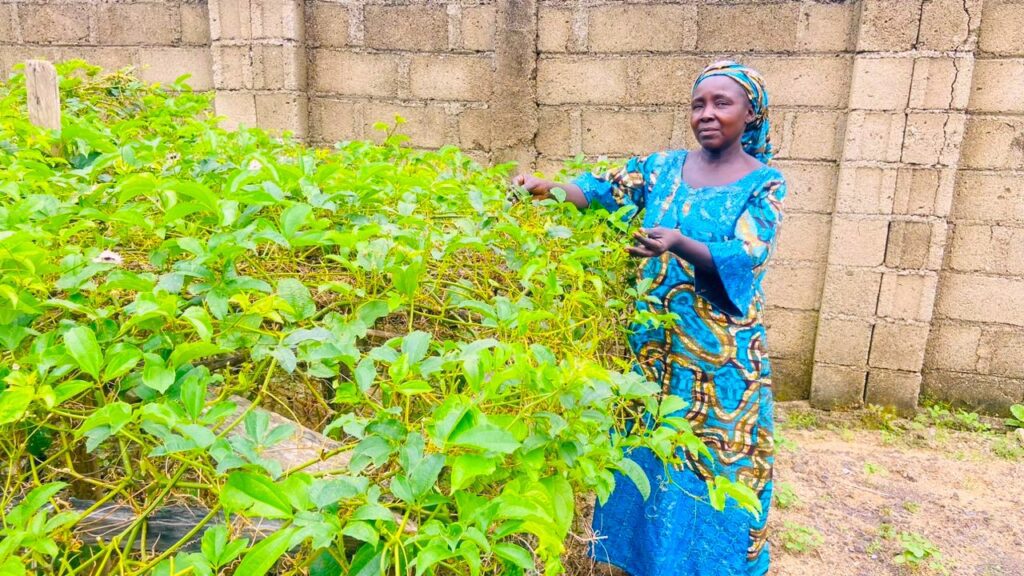
Bless, 2024
Before Nuru Nigeria began working in the area, Bless and her community were struggling to access basic vegetables. “We didn’t know about growing things like cucumber, pumpkin leaves, tomatoes, or okra,” she recalls. For Bless, fluted pumpkin was a lifeline in treating anemia, but she had to travel long distances to other communities in order to get them. The travel placed additional physical and financial stress on Bless.
When Nuru Nigeria introduced farmers to this simple, sustainable way of growing their own vegetables at home, Bless learned how to cultivate vegetable crops, “Now, we no longer need to buy okra or pumpkin leaves from the market. We grow them ourselves, and sometimes even sell them to earn money.” Bless says, “Our food has improved, and so has our health.”
Permagardens not only support access to healthy foods, but they bring financial opportunities to women in the community, as they sell excess produce for additional income. Furthermore, for Bless, the social impact has been just as profound, “Our neighbors now come to my place to buy vegetables, and we’ve started to interact with each other more than ever.” This social cohesion has strengthened bonds in the community, creating a sense of unity that had been missing in many places in northeast Nigeria due to previous conflicts.
World Food Day #FoodHeroes: Meet Florence

Florence, 2024
Florence, another woman in northeast Nigeria, did not believe she was capable of growing her own food because her family always bought vegetables from the market. When Nuru Nigeria began teaching women how to cultivate a permagarden, Florence was eager to learn.
She used the training she received to begin experimenting with a small backyard garden, and it quickly began flourishing. The vegetables she grew were not only enough to feed her household, but also to share with her neighbors. Soon, she was selling fresh, nutritious vegetables to people in her community, turning her garden into a source of income. With each sale, she carefully set aside a portion of her earnings, building up her savings.
Unexpectedly, Florence became very ill, requiring expensive hospitalization and medical treatment. With the savings she built up from vegetable sales, Florence was able to cover the hospital bills and pay for her treatment without going into debt. She shared, ”It was such a relief. Thanks to Nuru Nigeria, I could take care of my family and myself when I needed it the most.” During her recovery, Florence relied on the very vegetables she had grown to nourish her back to health. “I ate a lot of the vegetables I grew, and I regained my strength faster than I expected,” she shared, smiling.
Today, Florence is recognized as a leader in her community. “They’ve even given me a name,” she laughed, “They now call me Maman Ugwu—Mother of Pumpkin Leaves—because almost everyone buys vegetables from me.”
Beyond World Food Day: Work in Northeast Nigeria Continues
Nuru Nigeria continues to make impact in its operating communities. As we see documented in the five-year resilience study, despite the challenges in the region, Nuru Nigeria-supported smallholder farmers are increasing their adaptive and absorptive resilience. Absorptive resilience is demonstrated when farmers grow alternative crops, use savings, or access social safety nets. Adaptive resilience is more proactive and witnessed when farmers use drought-tolerant seeds, apply water-saving irrigation techniques, and use weather forecasting technology like ignitia.
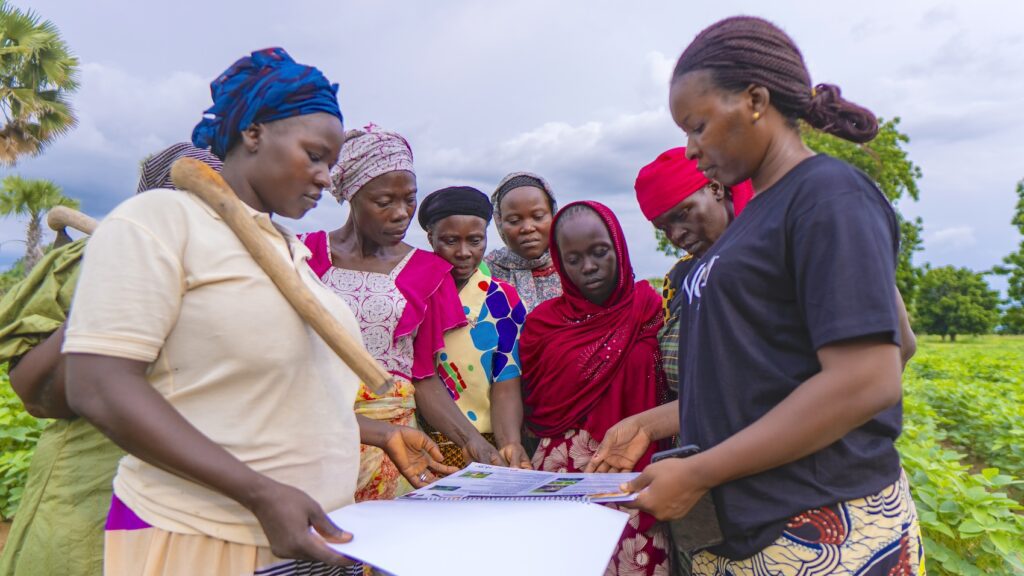
Women farmer training, Nuru Nigeria, 2023
As of April 2024, in the northeastern states of Borno, Adamawa, and Yobe, 4.8 million people were at risk of hunger during the lean season from June to August. Nuru Nigeria plans to scale into new areas to continue training on permagardens and CSA practices to increase higher-value legume yields and incomes, supporting smallholder farmers in securing their right to foods for a better life and a better future. The continued reach of permagarden training will enhance womens’ agency within the community, strengthening the capacity of agribusiness members to improve their food security and livelihoods for a better future.
The Right to Foods and a Better Future Across the Nuru Collective
Permagardens and CSA practices prioritize improved soil health, giving agribusiness members the tools to adapt to climate change and ensure their right to foods for a better life and better future. By promoting drought-tolerant seed varieties and offering food processing training, Nuru’s locally-led organizations tailor activities to strengthen rural resilience and equip agribusiness members to better cope with shocks, leading to improved household food security.
Nuru locally-led organizations champion the right to foods and a better future across the Nuru Collective. For example, in Ethiopia, extreme weather conditions and nutrient-poor crops created an opportunity for Nuru Ethiopia to pilot a drought-tolerant and nutritious legume crop–mung beans– that supported critical income and food security for communities during a devastating drought. In Burkina Faso, agribusiness members grow soybean, a drought-tolerant and sustainable crop that improves soil fertility over time while supporting household diets with vital nutrition.
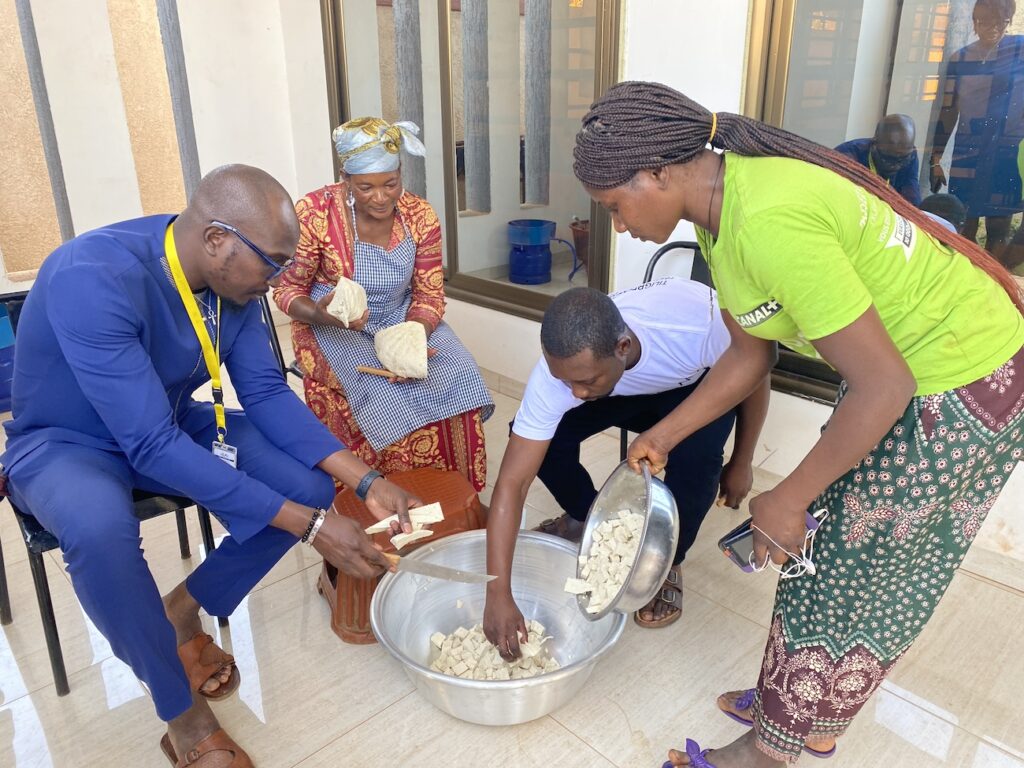
Making Tofu, Nuru Burkina Faso, 2023
As we consider the right to foods for improving the lives of rural entrepreneurs and their communities, it is essential to recognize the critical role of soil health in ensuring sustainable food security in the face of climate change. By utilizing CSA practices that prioritize soil health to maintain nutrients and water retention within the soil, Nuru agribusinesses build an enabling environment for crops to realize optimal yields, not just for one season, but for the many that will follow it. Nuru Kenya recently established demonstration plots in its newest area of operation, Baringo County, utilizing improved seed varieties and CSA practices to show farmers how climate-smart practices can increase both the quality and the quantity of their yields.
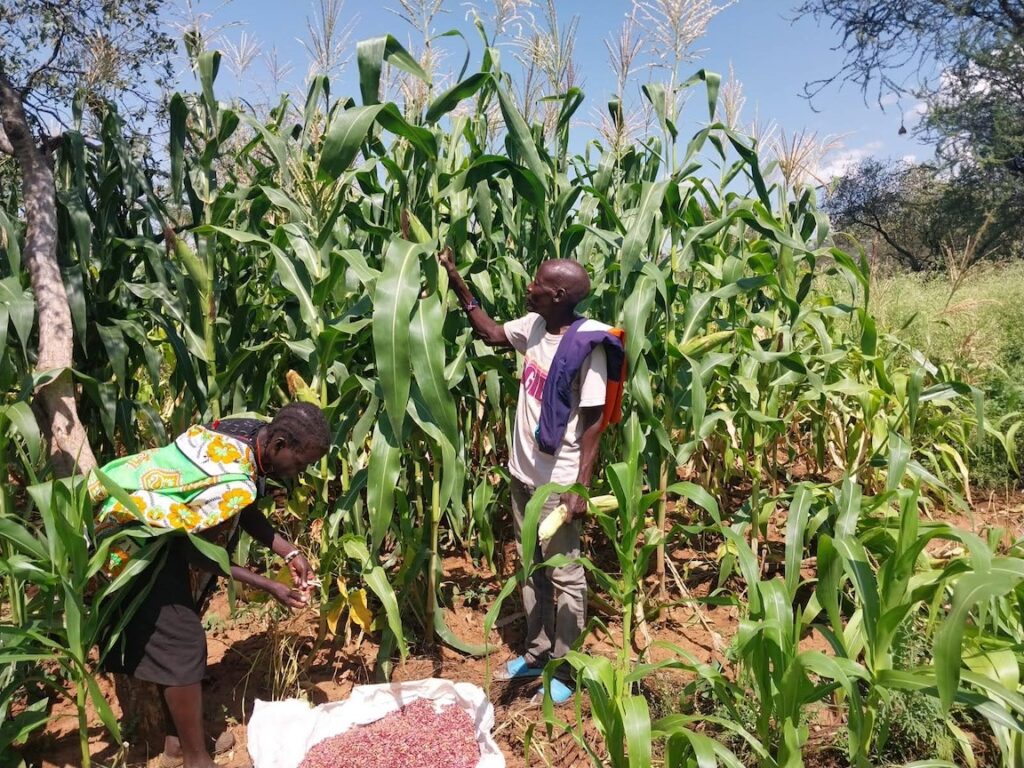
Cooperative Leaders Inspect corn and bean harvests, Baringo County, 2024
Nuru will continue to prioritize practices that promote the health and well-being of rural entrepreneurs, their communities, and the planet.


